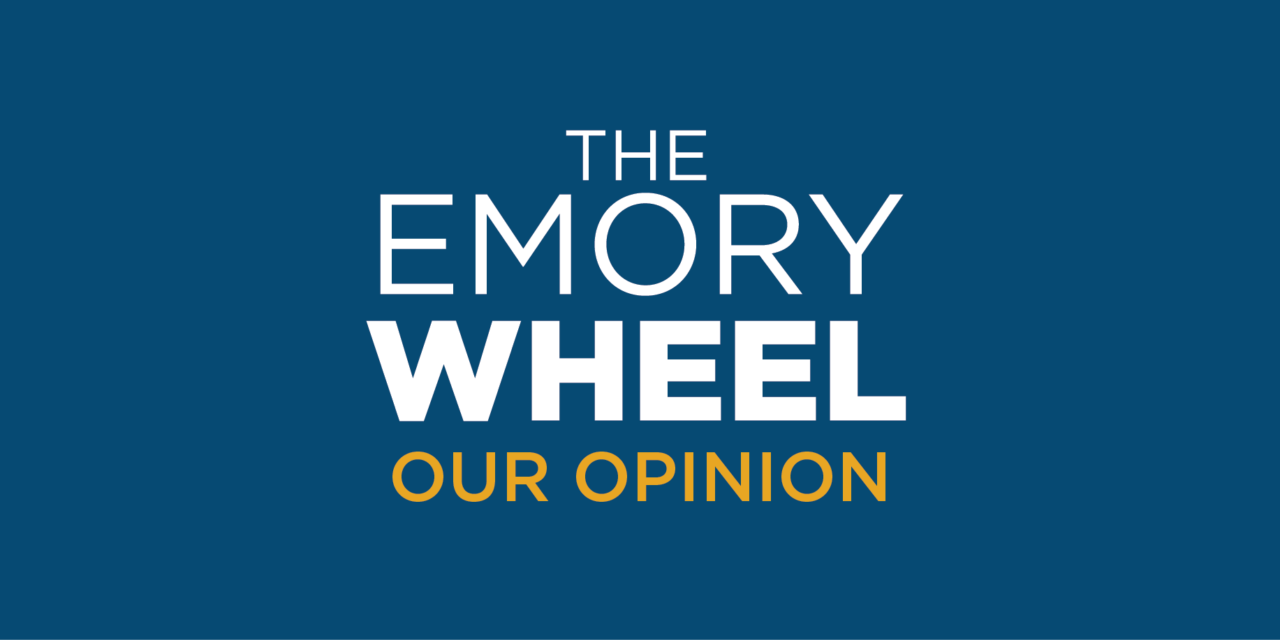These days, more courses are popping up that, unlike core courses in disciplines like science and history are designed to teach an existing body of knowledge, contextualize the current events of the world. The most recent example of such a niche course at Emory is “The Ferguson Movement: Power, Politics and Protest,” which the Center for Faculty Development and Excellence (CFDE) will offer in the fall. Two professors will facilitate the course, and other professors from a range of disciplines and backgrounds will guest lecture.
We at the Wheel see enormous value in this course and encourage the University to facilitate the introduction of other such courses that have the potential to bring the controversies that surround us under scrutiny inside the classroom.
Learning about events that are current and developing reconciles the problematic reality that although the world is radically impacted by current events on a daily basis, classes by-and-large are taught as though it is not, sticking to an inflexible, already decided upon curriculum. The nature of most courses necessitates such stability in order to achieve the goal of educating students. However, as the current pattern of police brutality against blacks in America continues, courses in a number of academic disciplines should weave this ongoing problem into their curriculum.
When an event happens that directly relates to a course’s subject matter, it is a disservice not to at least acknowledge the relationship in the classroom.
In this moment, digital media is rampant, and as it grows, so does the ability for immediate responses to events. Take documentaries, for instance. Today, independent filmmakers with small crews and low budgets have the ability to create quality films and release them to the public in a short amount of time.
College classrooms have this same capacity to respond immediately to current events, and “The Ferguson Movement,” may demonstrate this.
We hope that “The Ferguson Movement” exposes the reality of racism in American culture, and that as a course on a controversial topic, it regularly sparks vibrant and honest peer discussion. The course should question the views held by the majority, for it is in examining assumptions we take for granted that we get at the roots of widespread social issues and challenge them.
In some sociology courses the phenomenon of alienation in the classroom is readily observed, causing white students, whose people have throughout modern history exerted their power upon the rest of the world, to avoid taking classes that shed light on this history. The most effective way that this can be reckoned with is by raising as much awareness of the repercussions still very much alive today.
“The Ferguson Movement” seems like a formidable challenge to the mentality of ignoring discussions about uncomfortable or controversial issues. These issues might be very sensitive for some and very difficult for others to engage with in a classroom setting, but overcoming these obstacles and working through these issues is a form of learning in and of itself.
Some students have voiced that they wish a course like this were introduced even prior to the events in Ferguson. Since the issue of systematic oppression of the black population in America has occurred long before the killing of Michael Brown, this move begs the question of why Emory is so late in putting together such a course.
Furthermore, students are concerned that “The Ferguson Movement” is merely a reaction to the events, rather than a proactive course that would aim to prepare students to face the realities that lie ahead. An example of a proactive course is “Men Stopping Violence,” offered here at Emory by an Atlanta-based not-for-profit program that aims to mobilize men and cultivate male leaders to prevent intimate partner violence. But we must not rule out the possibility that although the course itself is reactive, it will condition those students who take it to be more proactive towards the issue of racism in their everyday lives.
There are over 400 faculty on campus and each could potentially provide the framework for a course relating their expertise to current events. Of course, University money and professors’ time are two clear limitations to the eventual expansion of current event-related courses like “The Ferguson Movement.”
But in the meantime, professors should at least feel encouraged to weave current events into their curriculum as the semester unfolds. Even just a brief mention of relevant events is a huge step from not acknowledging them at all.
To the administration, we ask that they continue to pave the way for the growth of these courses by providing funding when viable and by encouraging interdepartmental communication and collaboration as a means of bringing the events of the world alive in the classroom before they become history.
The above staff editorial represents the majority opinion of the Wheel’s editorial board.
The Emory Wheel was founded in 1919 and is currently the only independent, student-run newspaper of Emory University. The Wheel publishes weekly on Wednesdays during the academic year, except during University holidays and scheduled publication intermissions.
The Wheel is financially and editorially independent from the University. All of its content is generated by the Wheel’s more than 100 student staff members and contributing writers, and its printing costs are covered by profits from self-generated advertising sales.





